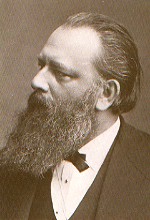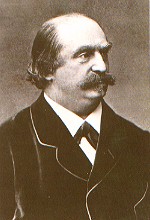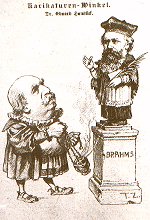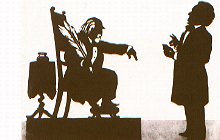-
Biography
-
People around Brahms
-
The Viennese
circle of friends around Johannes Brahms:
-
Christian Albert
Theodor Billroth
-
Brüll, Ignaz
-
Epstein, Julius
-
Faber, Arthur
-
Fellinger, Dr. Richard
-
Hanslick, Eduard
-
Hellmesberger,
Joseph
-
Heuberger, Richard
Franz Joseph
-
Kalbeck, Max
-
Miller-Aichholz,
Viktor
-
Mandyczewski, Eusebius
-
Nottebohm, Martin
Gustav
-
Brahms and Wagner
-
Works
|
|
The Viennese circle of friends around
Johannes Brahms
Billroth, Theodor
Born in 1829 in Bergen (Germany), deceased in 1894 in Opatja (Croatia)
Outstanding surgeon of the Viennese medical school, from 1867 on professor
at the university of Vienna. In 1882, Billroth founded the first private
institute for laic nurses with integrated hospital („Rudolfinerhaus") under
the auspices of Prince Imperial Rudolf (1858-1889). On his initiative,
an own house was built in 1893 for the Gesellschaft der Ärzte (physician
society) in Vienna which president he was since 1888. Billroth refused
two chairs in Berlin because of his love of music and visual art (he was
friends with Johannes Brahms and Eduard Hanslick)
He studied medicine in Greifswald, Göttingen and Berlin. After
obtaining of a doctorate, he was assistant of Langenbeck in Berlin. He
concerned himself already early with music and neglected therefore his
medical studies for a long time. In 1860, he was appointed professor
in Zurich. In the mid-sixties, he met Brahms there. In 1867, he
accepted a call to the university of Vienna to be in the second surgical
chair. Despite calls to the university of Berlin, he left Vienna never
again.

Theodor Billroth
In Vienna, he started developing systematically almost inaccessible
fields of the medicine till then. He showed new methods of operation or
developed them, such as for example operations of the liver, the spleen,
the urocyst and so on. But his principal merit is to have ventured on operations
in the area of the stomach and the intestines and to have developed their
technique.
His humanitarian efforts are a monument to the famous surgeon
at the Rudolfinerhaus, which had to serve and serves already today in an
exemplary manner the teaching of the nursing. He was equally important
as scholar and scientist, as clinical teacher and master of the operative
technique and all this made him the most important surgeon before the turn
of the century.
Billroth lived in Zurich when he heard Brahms playing. The two
men made friends rapidly. As Billroth lived in Vienna, he belonged to the
closest circle of friends of the composer. The lively correspondence between
the two friends is published in parts and bespeaks their deep friendship.
Richard
Heuberger quoted in his memories of Johannes Brahms that Brahms was
very cautious concerning the publication of confidential letters: Brahms
told Heuberger that he had held Billroth's best letters back. They went
together to concerts and, as Billroth was an excellent musician himself,
Brahms regarded his opinion about musical matters as very serious. At Billroth's
apartment at Alserstraße 20, Brahms's works were often performed
for the first time during private concerts. They also went traveling with
Billroth's family. Brahms took his first trip to Italy with the surgeon,
for instance. In summer, they visited each other at their summer domiciles.
Brüll, Ignaz
Born in 1846 in Proßnitz (Czech Republic), deceased in 1907 in Vienna
Pianist, composer.
Johannes Brahms appreciated his talent as pianist. He composed ten
operas, his comic opera „Das goldene Kreuz" (1875) was particularly successful.
He composed also piano concertos, lieder and chamber music.
Epstein, Julius
Born in 1832 in Zagreb (Croatia), deceased in 1926 in Vienna
Pianist, piano teacher
Studied in Vienna from 1850 on and became soon famous for his interpretations
of classical works (in particular of Mozart). From 1867 to 1901, Epstein
was professor at the Viennese conservatory. Among his students were Ignaz
Brüll, Franz Schalk (1863-1931) and Gustav Mahler (1860-1911). In
1862, he lived in the Figarohaus (Wien 1., Schulerstraße 8, Domgasse
5) where Johannes Brahms visited him.
Faber, Arthur
Industrial magnate in Vienna. His wife Bertha Faber, née Porubszky,
was intimate with Brahms already in Hamburg.
Fellinger, Dr. Richard
Born in 1848, deceased in 1903
General manager of Siemens.
Since 1881, he and his wife Maria Regina Fellinger (1849-1925) were
close friends with Brahms.
Hanslick, Eduard
Born in 1825 in Prague, deceased in 1904 in Baden near Vienna. Music critic,
music historian, music scientist.
Took music lessons in his youth in Prague, studied law (doctorate in
1849) and became civil servant. In 1848, he became music reporter of the
Wiener Zeitung, from 1853 to 1864, he worked as music critic for „Die Presse"
and from 1864 on for the „Neue Freie Presse". In 1856, he habilitated in
esthetics and history of music at the university of Vienna. Hanslick's
critics had a great influence on the Viennese musical life. He supported
Johannes Brahms, but turned against Richard Wagner (1813-1883), Anton Bruckner
(1824-1896) and Franz Liszt (1811-1886), who represented the so-called
new German movement. Initially, Richard Wagner wanted to call Beckmesser
in his „Meistersinger" Hans Lick...

Eduard Hanslick
Eduard Hanslick knew all the famous composers and musicians of his time,
he kept track of the musical events and currents with the highest attention
and tackled them. His brilliant pen, his well-founded knowledge and his
power of judgment made him the leading critic of Europe at that time.
He took the first music lessons with his father who held a chair
of esthetics at the university of Prague for a while. From 1843
on, V. J. Tomásek instructed him in piano, theory and composition
for four years. From 1844 on, Hanslick studied in Prague for three
years, then law in Vienna - the public service career assured his livelihood,
while the music became his inner profession. Already early, he wrote reviews
and articles for the Wiener Musikzeitung (Viennese music journal). After
obtaining of a doctorate of law, he was fiscal in Klagenfurt for two years,
from 1852 on, he worked for the ministry of Culture and Education
in Vienna. In 1854, his paper „Vom Musikalisch-Schönen" (about
the musically beautiful) was published, which created a sensation and he
was greatly acclaimed, but by this he incurred also the hatred of Richard
Wagner and his fans. In 1856, was offered a chair at the faculty
of philosophy of the university of Vienna as private lecturer for history
and esthetics of music, he became senior lecturer in 1861 and full
professor in 1870. He worked as critic for the Wiener Musikzeitung
from 1846 on, for the Wiener Zeitung in 1848/49, for the
Presse from 1855 to 1864 and since then for the Neue Freie
Presse. He met Johannes Brahms in 1862, remained amicable to him
all his life and admired his music, but not without uncritical disposition.

Eduard Hanslick adulating the statue
of Saint Johannes Brahms
(contemporary cartoon)
Hellmesberger, Joseph
Born in 1828 in Vienna, deceased in 1893 in Vienna
Court concertmaster, conductor and quartet primarius.
Studies under his father Georg Hellmesberger (1800-1973) at the conservatory,
from 1840 on, violin professor at the conservatory. From 1855 to 1877,
he was concertmaster of the court opera orchestra and so also of the Vienna
Philharmonic Orchestra, in 1877, he was promoted court conductor. In 1849,
he founded a string quartet, which pleaded particularly for Ludwig van
Beethoven's late string quartets and Franz Schubert's works, but performed
also compositions by Johannes Brahms and Anton Bruckner.
Heuberger, Richard Franz Joseph senior
Born in 1850 in Graz, deceased in 1914 in Vienna
Opera and operetta composer, conductor, musician, critic.
Studied technology (Bachelor of Engineering in 1875, railway engineer)
and became civil servant. Already in 1876, he devoted himself completely
to music, became choirmaster of the „Academische Gesangsvereins" and moved
to Vienna. He worked as composer, choir conductor (in 1878 Wiener Singakademie,
Männergesangs-Verein), music author and music critic. In 1902, he
became teacher at the conservatory.
Kalbeck, Max
Born in 1850 in Wroclaw (Poland), deceased 1921 in Vienna
Music author, theater critic, poet (under the pen name Jeremias Deutlich).
Studied law, philosophy and musical theory. In 1874, Kalbeck became
theater critic ans archivist at the museum of Art in Wroclaw. From 1880
on, he was music and theater critic in Vienna. He was friends with Johannes
Brahms and Johann Strauss (1825-1899). He published several collections
of poems and wrote a biography of Johannes Brahms (4 volumes, 1898-1912).
Miller-Aichholz, Viktor
Born in 1845 in Vienna, deceased in 1910 in Vienna
Chemist, industrial magnate.
Studied chemistry at the universities of Vienna, Zurich and Heidelberg
and took over later the „Erste österreichische Sodafabrik" (first
Austrian soda factory) founded by his father in Hruschau (Silesia). He
was also mayor there (creation of social services for the small commune).
After his move to Vienna, he applied himself to the numismatics. Within
20 years, he had at the risk of considerable funds the third largest private
numismatic collection of the mornarchy (his son handed 15000 coins from
the Austrian part of the collection over to the art-history museum). Miller-Aichholz
was a good pianist and took part himself in charity concerts, supported
considerably the erection of the Brahms monument in Vienna, opened a Brahms
museum on his estate in Gmunden, founded the Brahms society in Vienna and
was its first president.
Mandyczewski, Eusebius
Born in 1857 in Czernowitz (Ukraine), deceased in 1929 in Vienna
Composer, musicologist.
Began his studies at the university of Czernowitz, came to the university
of Vienna in 1875, where he studied musicology under Eduard Hanslick and
musical theory under Martin Gustav Nottebohm. From 1879 to 1881 choirmaster
of the Wiener Singakademie. Johannes Brahms supported the young composer
and appointed him as curator of his estate. From 1887 to 1929, Mandyczewski
was archivist and librarian of the Gesellschaft der Musikfreunde. He taught
also at the conservatory and contributed considerably to the publication
of the complete works of Franz Schubert, Joseph Haydn and Johannes Brahms.
Nottebohm, Martin Gustav
Born in 1817 in Germany, deceased in 1882 in Graz
Music historian, music author and Beethoven research scientist.
Studied in Berlin and Vienna, was student under Felix Mendelssohn-Bartholdy
(1809-1847), Robert Schumann (1810-1856) and Simon Sechter (1788-1867).
He took up residence in Vienna in 1845. He gave private piano lessons.
Brahms and Wagner
From the beginning, the relations of the two composers were clouded by
personal differences. In 1860, Brahms was among the subscribers
against the Neudeutsche Schule (new German school) represented mainly by
Liszt and Wagner. On February 6th 1864, the two masters met for
the first time in Wagner's apartment in Vienna, Hadikgasse 72: at that
time, Wagner had words of appreciation for the Haydn variations that Brahms
played for him. Later, he judged more distantly of his symphonic work,
attested him certain „tough melodics" and criticized the transference of
the chamber musical style to the orchestra.

The critic Eduard Hanslick and Richard Wagner
Silhouette
The fact that Brahms entertained friendly relations with Eduard Hanslick,
the influential Viennese critic and confirmed opponent of Wagner, did not
bring the two composers closer to each other. The adversaries of Wagner
built up Brahms as his antagonist: The fronts between the disciples of
Wagner and Brahms hardened in polemic quarreling about the character of
music. Wagner reacted to the award of the honorary degree of doctor of
the university of Wroclaw to Brahms with the article „Über das
Dichten und Komponieren" (about writing and composing) in which he
attacked Brahms publicly with vehemence. After Wagner's death, his fans
regarded Anton Bruckner as new „bellwether" and made him Brahms' antagonist.
Especially in later years, Brahms respected and esteemed the works of Wagner
and had words of appreciation for them. Only rarely and in most cases just
in his closest circle of friends, he criticized Wagner's works, but then
he gave utterance to his aversion particularly for the texts of the sphere
of the German mythology.
 |